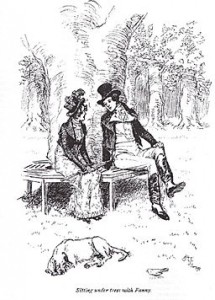 I’ve been spending a good deal of time reading on the sofa over the last couple of weeks, thanks to the combination of a recalcitrant computer and a sore throat.; one doesn’t really need to find excuses for reading, but it has made me feel a bit like Lady Bertram. And, yes, one of the books I’ve been reading, and which I read very happily every few years is MansfieldPark.
I’ve been spending a good deal of time reading on the sofa over the last couple of weeks, thanks to the combination of a recalcitrant computer and a sore throat.; one doesn’t really need to find excuses for reading, but it has made me feel a bit like Lady Bertram. And, yes, one of the books I’ve been reading, and which I read very happily every few years is MansfieldPark.
I know MansfieldPark isn’t most people’s favourite Jane Austen novel; largely due to the character of Fanny Price, who’s seen as priggish and passive and dull. Edmund is a dull stick too, and every reader regrets that Fanny and Henry Crawford don’t make it in the end. Even Jane Austen’s family found it an unsatisfactory ending, and begged her to change her mind over Henry.
Fanny has no real friends at Mansfield, apart from Edmund when he can be bothered, and the constant drip of acid from the ghastly Mrs Norris over the years would wear away the soul of a much stronger person. And in fact, in spite of her blushes and sighs, Fanny is quite a strong minded character once she gets an idea into her head. Consider the business of the play, the scene where most modern sensibilities part company with the author – what is quite so appalling about amateur dramatics – something we know that the Austen family enjoyed? And yet, when you look closely, you can see the cracks in the Mansfield plan. For a start doing something so invasive while the master of the house is away is a bit like modern teenagers hosting a party in the absence of parents. And there’s something distasteful about Maria and Henry carrying on their flirtation under the gormless eye of poor Mr Rushworth. Fanny feels it is wrong, and she sticks to her guns, though it brings her ridicule and criticism all round. We might not agree with her entirely, but we can admire her for it.
And most modern readers feel that Austen is unfair on Mary Crawford, who has wit, charm and sparkle. How is she different from Elizabeth Bennet? And yet, she is. Again modern readers don’t share all Austen’s criticisms of her – we don’t really mind her talking lightly of her immoral uncle the admiral ( and is that really a pun on ‘rears and vices?’ probably not, alas) but there are occasions in the story when she’s quite insensitive. She’s unkind to Fanny, whom she knows occupies the lowest of places in the household, when she spends too long riding Fanny’s horse, she’s very sneaky when she fobs off Henry’s necklace on an unsuspecting Fanny. And if she fancies Edmund, it’s not very bright of her to be so rude about his profession.
But in spite of all this, MansfieldPark is a disappointment. And that’s largely because Austen seems to be about to be setting up a situation in which two characters develop and change for the best. Henry, who starts off with a plan of callous seduction towards Fanny, does seem to have reformed and developed true feelings for her. And Fanny, though quite understandably suspicious of his motives at first, is impressed by his impeccable behaviour at Portsmouth , and just beginning to soften towards him. What an interesting romance that would have been – Henry refined by Fanny, Fanny becoming stronger and more assertive with such a man to love her.
But of course it’s not to be. Every time I read these final chapters, I have a secret hope that this time the story’s going to be different, that Fanny and Henry will make it, but they never do. And I think Mansfield Park doesn’t really work if you see it as a story with a happy ending – it’s essentially a tragedy, people misled through vanity and lust and deceit – no-one’s really happy at the end. Fanny does get her Edmund, but in so perfunctory a manner that we can’t really care about it. The once happy scene of family and friends at Mansfield is smashed entirely. Maria is horribly banished with only Mrs Norris for company, Julia has made an unsatisfactory marriage, Tom is a shadow of himself, and the once lively Crawfords will never be seen again. ‘Let other pens dwell on grief and misery’ says Jane Austen airily, but the grief and misery is there, and you can’t help be aware of it.
Yet Mansfield Park remains one of my favourite Austen books – the delights outweigh the disappointments, the wonderful Sotherton scene, the drama -in everyway- of Lover’s Vows, Mr Rushworth and his two and forty speeches, the sheer nastiness of Mrs Norris, the vaguenesses of lady Bertram, all the scenes with the Crawfords – it’s the best of reads when you’re sitting on the sofa with a sore throat and no computer.